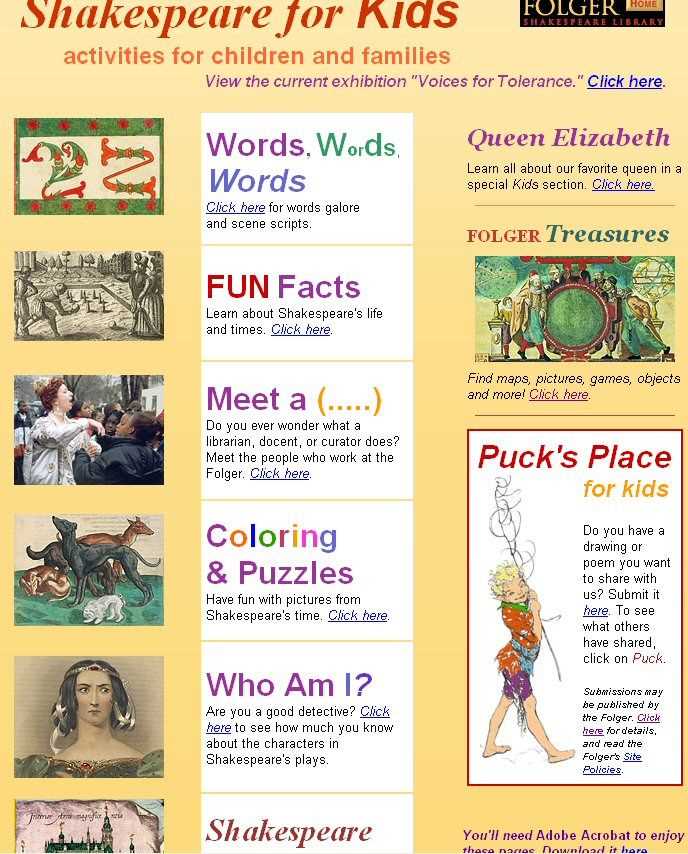
Shakespeare, the renowned playwright and poet, has captured the world’s imagination for centuries. His works, including timeless classics like Romeo and Juliet, Hamlet, and Macbeth, have been the subject of countless studies and adaptations. Despite the wealth of information available, there are still many mysteries surrounding Shakespeare’s life and work.
In order to uncover the truths about Shakespeare, many scholars and enthusiasts have turned to webquests. Webquests are online activities designed to guide users through the process of researching and analyzing information on a specific topic. They allow individuals to delve deep into the realm of Shakespeare’s works, exploring his influences, the context of his plays, and even the authorship debate.
Webquests related to Shakespeare offer a unique opportunity to gain a comprehensive understanding of his life and works. By combining various resources such as articles, videos, and interactive quizzes, participants can follow a structured path to find answers to their burning questions. In the quest for knowledge, they may discover intriguing details about Shakespeare’s personal life, his writing techniques, or the social and political climate of Elizabethan England.
Whether you are a student, a theater enthusiast, or simply a curious individual, embarking on a webquest can be an enriching and engaging experience. Not only does it provide valuable insights into Shakespeare’s world, but it also encourages critical thinking, research skills, and teamwork. So, put on your detective hat and embark on a webquest to unravel the mysteries of Shakespeare’s extraordinary legacy.
What is Webquest Shakespeare?
Webquest Shakespeare is an online educational tool that allows students to explore the life and works of William Shakespeare through a series of interactive activities and resources. It is designed to engage students in critical thinking, research, and collaborative learning, while also helping them develop a deeper understanding and appreciation for Shakespeare’s contributions to literature and drama.
This webquest provides students with a guided exploration of Shakespeare’s life, including his upbringing, education, and career as a playwright and actor. It also delves into the historical and cultural context of Elizabethan England, highlighting the social, political, and artistic influences that shaped Shakespeare’s works.
Through a series of carefully curated websites, videos, and other multimedia resources, students are tasked with researching and analyzing key themes, characters, and literary devices found in Shakespeare’s plays. They are encouraged to critically evaluate and interpret the language and imagery used by the playwright, as well as the relevance and enduring impact of his works in the present day.
Webquest Shakespeare also incorporates interactive elements, such as quizzes, discussions, and group projects, to foster active participation and collaboration among students. By working together to complete tasks and solve challenges, students not only deepen their understanding of Shakespeare’s works, but also develop important skills such as communication, teamwork, and digital literacy.
- Overall, Webquest Shakespeare provides a comprehensive and engaging learning experience that seeks to make Shakespeare more accessible and relevant to today’s students. Through its interactive activities, multimedia resources, and collaborative approach, it aims to inspire a lifelong love for literature and an appreciation for the enduring genius of William Shakespeare.
Why is Webquest Shakespeare popular?

Webquest Shakespeare is popular for several reasons.
Interactive Learning: Webquest Shakespeare offers an interactive and engaging way to learn about the life and works of William Shakespeare. Through various tasks and activities, learners can explore different aspects of Shakespeare’s plays, poetry, and his impact on the English language. This interactive approach enhances the learning experience and makes it more enjoyable for students.
Access to Resources: Webquest Shakespeare provides access to a wide range of resources related to Shakespeare, including articles, videos, and online libraries. These resources enable students to delve deep into Shakespeare’s works, understand the historical context, and analyze his writing style. The availability of such extensive resources enhances the quality of learning and enables students to conduct in-depth research.
Collaborative Learning: Webquest Shakespeare encourages collaboration among students. Through group projects and discussions, students can share their understanding and interpretations of Shakespeare’s works and learn from each other’s perspectives. Collaborative learning facilitates critical thinking and creativity, as students engage in meaningful conversations and debates.
Flexibility and Convenience: Webquest Shakespeare offers flexible learning options where students can access the material at their convenience. They can work on the webquest at their own pace, allowing for personalized learning. The webquest can be accessed from any device with an internet connection, enabling students to learn anytime and anywhere.
Overall, the popularity of Webquest Shakespeare lies in its interactive nature, access to resources, collaborative learning opportunities, and flexibility, making it an effective and engaging tool for learning about the life and works of William Shakespeare.
Understanding Shakespeare

William Shakespeare is one of the most famous playwrights in history, known for his incredible talent in writing plays, poems, and sonnets. His works continue to be studied and performed around the world, centuries after they were written.
Understanding Shakespeare’s writing style and language can be a challenge, as he used intricate wordplay, metaphors, and poetic devices in his works. However, once you delve into his plays and poems, you will discover a world of emotions, themes, and characters that are still relevant today.
Language: Shakespeare wrote in Early Modern English, which can be difficult to understand for contemporary readers. To fully grasp his works, it is important to familiarize yourself with the vocabulary, grammar, and pronunciation of this time period. This will enable you to appreciate the beauty and the complexity of his language.
Themes: Shakespeare’s works explore a wide range of themes, including love, ambition, power, fate, and revenge. His plays often provide a deep insight into the human condition, raising thought-provoking questions about morality and the consequences of our actions.
- Literary devices: Shakespeare was a master of using literary devices to enhance his writing. He employed metaphors, similes, alliteration, and personification to create vivid imagery and evoke strong emotions in his audience.
- Characters: Shakespeare’s characters are iconic and memorable, ranging from star-crossed lovers like Romeo and Juliet to complex villains like Macbeth. Each character is layered and multi-dimensional, with their own motivations, flaws, and desires.
- Social and historical context: Understanding the social and historical context in which Shakespeare lived can provide valuable insights into his works. It helps us connect with the themes and issues he was exploring, such as the role of women, the political climate, and the cultural beliefs of Elizabethan England.
Background of William Shakespeare
William Shakespeare was an English playwright, poet, and actor, widely regarded as the greatest writer in the English language and the world’s pre-eminent dramatist. He was born in Stratford-upon-Avon, Warwickshire, England, in April 1564. Shakespeare’s exact date of birth is not known, but it is traditionally celebrated on April 23, which is also the date of his death in 1616.
Shakespeare’s plays and poems are known for their exceptional literary and linguistic brilliance. His works explore a wide range of themes, including love, betrayal, ambition, and revenge, and his characters are often complex and deeply human. Some of his most famous plays include “Romeo and Juliet,” “Hamlet,” “Macbeth,” and “Othello.” Shakespeare’s plays were performed at the famous Globe Theatre in London, where he was also a shareholder.
Shakespeare’s writing style:
Shakespeare’s writing style is characterized by his use of poetic language, elaborate metaphors, and wordplay. He often employed iambic pentameter, a rhythmic pattern consisting of five stressed and unstressed syllables per line, which gives his verse a musical quality. Shakespeare also pioneered the use of blank verse in drama, which is unrhymed iambic pentameter, and he used it to great effect in his plays.
Shakespeare’s works have had a profound and lasting impact on literature and theater. His plays continue to be performed and studied around the world, and his words have become part of the English language. Shakespeare’s influence can be seen in the works of countless playwrights, poets, and novelists who came after him, making him one of the most important figures in literary history.
Importance of Shakespeare’s works
Shakespeare’s works hold immense significance in the field of literature and have left a lasting impact on the English language and theatrical traditions. His plays, poems, and sonnets continue to be studied, performed, and celebrated worldwide.
Influential Language: Shakespeare’s writings have contributed extensively to the development and enrichment of the English language. He introduced numerous new words, phrases, and expressions, many of which are still in use today. Without his contributions, the English language would not have been as versatile, expressive, and rich as it is now.
- Examples: “all’s well that ends well,” “break the ice,” “fancy-free,” “forever and a day”
Innovative Storytelling: Shakespeare’s plays revolutionized the art of storytelling by combining intricate plots, complex characters, and deep psychological insights. His works explore universal themes such as love, power, betrayal, and human nature, making them relevant even in modern times. The creativity and depth of his narratives have inspired countless writers and playwrights, leaving an indelible mark on the world of literature.
- Example: His tragedy, “Romeo and Juliet,” presents the timeless tale of two young lovers caught in the throes of a cruel, familial feud, showcasing the power of love and the devastating consequences of hate.
Iconic Characters: Shakespeare’s plays have given us some of the most memorable characters in literary history. Whether it’s the star-crossed lovers Romeo and Juliet, the power-hungry Macbeth, or the witty and mischievous Puck from “A Midsummer Night’s Dream,” his characters possess depth, complexity, and resonance. They continue to captivate audiences and serve as archetypes for future literary creations.
| Character | Play |
|---|---|
| Hamlet | Hamlet |
| Lady Macbeth | Macbeth |
| Juliet | Romeo and Juliet |
In conclusion, Shakespeare’s works have left an indelible mark on the world of literature, language, and theater. His writings continue to inspire, entertain, and resonate with audiences across generations, demonstrating the enduring importance and influence of his genius.
Webquest Shakespeare Answers
In this webquest, we have explored the life and works of William Shakespeare, one of history’s most famous playwrights and poets. Through our research, we have gained a deeper understanding of Shakespeare’s life, his contributions to literature, and his lasting impact on the world of theater.
We have delved into Shakespeare’s biography, learning about his early life in Stratford-upon-Avon, his career in London, and his family. We have discovered that Shakespeare was not only a renowned playwright, but also a poet and an actor. His plays, such as “Romeo and Juliet,” “Hamlet,” and “Macbeth,” have become iconic and continue to be performed and studied today.
Key Findings:
- Shakespeare was born in 1564 and died in 1616.
- He wrote 37 plays and 154 sonnets.
- Shakespeare’s works are divided into three genres: comedies, tragedies, and histories.
- His plays were performed at the Globe Theatre in London.
- Shakespeare’s language and wordplay have had a significant influence on the English language.
Overall, our webquest has allowed us to explore the life and works of William Shakespeare in depth. We have gained a greater appreciation for his genius and the enduring impact he has had on literature and theater. Through his plays and poetry, Shakespeare has captured the essence of human emotions and continues to inspire and entertain audiences around the world.
What is the purpose of Webquest Shakespeare?
Webquest Shakespeare is a digital educational platform that aims to provide a comprehensive and interactive learning experience about the renowned playwright William Shakespeare. Its purpose is to enable students and enthusiasts to delve deeper into the life, works, and historical context of Shakespeare through a series of curated web quests.
Through Webquest Shakespeare, learners can explore various aspects of Shakespeare’s life, such as his early years, education, family, and career. They can also engage with the cultural and historical background of the Elizabethan era, which profoundly influenced Shakespeare’s writing. The platform offers a range of web quests, each focusing on a specific play, enabling users to analyze the plot, characters, themes, and literary devices used by Shakespeare in his works.
By participating in Webquest Shakespeare, students can enhance their critical thinking, research, and analytical skills. The platform encourages active learning by prompting users to read, analyze, and interpret Shakespearean texts, thereby fostering a deeper understanding of the playwright’s literary genius. Additionally, Webquest Shakespeare provides a collaborative learning environment, allowing users to share their discoveries, insights, and interpretations with fellow learners, further enriching the educational experience.
The key objectives of Webquest Shakespeare include:

- Facilitating a deep understanding of Shakespeare’s life and works
- Developing critical thinking and analytical skills
- Encouraging research and independent learning
- Promoting collaboration and knowledge sharing among learners
- Providing an interactive and engaging learning experience through web quests
In conclusion, Webquest Shakespeare serves as a comprehensive educational platform that offers a unique and immersive learning experience about William Shakespeare. By exploring the life and works of this iconic playwright, students can develop various skills and gain a profound appreciation for the literary and cultural significance of Shakespeare’s contributions to the world of literature.